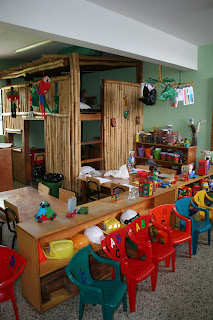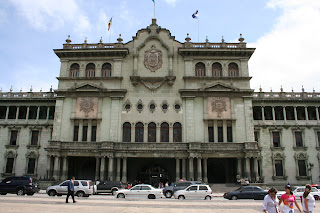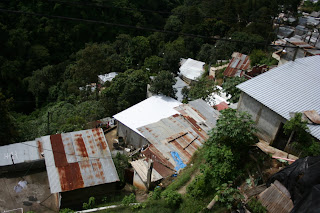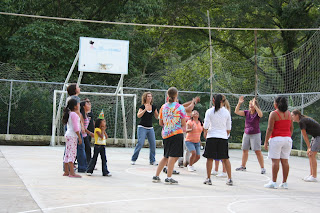Leaving Guatemala is far more difficult than any of us could have imagined. We had a wonderful morning touring Antigua and a fun evening Pizza Party with the children. In only one short week we have been able to bond with the children and staff here at Dorie's Promise. We were able to meet amazing people in extraordinary situations and gain a new perspective on what life is really like for people. We are so insulated in America to the plight of those who really struggle. Very few people in our country truly struggle. We have seen people dig in the dump to get paper that is then sold to a recycler for 10 cents per pound.
Giving what seems like a small gift to one person makes an incredible impact on his or her life. I was thanked this evening for coming to help, as Abel put it, "his country because they need a lot of help." He was sure to tell me that he'd be ready when we came back.
What else can we do to make a difference?
Valley Grace Missions
Saturday, August 6, 2011
Friday, August 5, 2011
Life at the Guatemala City Dump
In America, our trash is collected and then delivered to a landfill. There are volumes of regulations about the proper management of trash. In Guatemala City the regulations involve less environmental concerns and more interest in selling permits to sort.
Citizens can purchase a permit to collect from the Guatemala City dump. The permit allows them to enter the dump and collect items from the trash trucks to sort and resell. You can watch from the cemetary above as trucks back up and people immediately converge on the pile. They collect anything that can be recycled or cleaned and resold. More than 20,000 people live in the surrounding slum and rely on the dump for their income.
Sitting high above the dump is the National Cemetery where families can rent burial spots. When they are unable to pay the burial rent, the bodies are removed and thrown over the cliff into the dump. There is no respect for life. The value of a person's dignity is 250 quetzales (approximately $36) every two years.
Even in the depths of the Guatemala dump, good still exists. We toured Safe Passage today. They operate schools to help educate the children who live in the slums surrounding the dump. Nine hundred children receive food and schooling in a clean, progressive environment. They also created a micro-enterprise for the women to create beautiful jewelry from recycled trash.
Citizens can purchase a permit to collect from the Guatemala City dump. The permit allows them to enter the dump and collect items from the trash trucks to sort and resell. You can watch from the cemetary above as trucks back up and people immediately converge on the pile. They collect anything that can be recycled or cleaned and resold. More than 20,000 people live in the surrounding slum and rely on the dump for their income.
Sitting high above the dump is the National Cemetery where families can rent burial spots. When they are unable to pay the burial rent, the bodies are removed and thrown over the cliff into the dump. There is no respect for life. The value of a person's dignity is 250 quetzales (approximately $36) every two years.
Even in the depths of the Guatemala dump, good still exists. We toured Safe Passage today. They operate schools to help educate the children who live in the slums surrounding the dump. Nine hundred children receive food and schooling in a clean, progressive environment. They also created a micro-enterprise for the women to create beautiful jewelry from recycled trash.
Thursday, August 4, 2011
McDonald's bringing Perspective
Today, we saw some beautiful sights in the Presidential Palace of Guatemala City. There were magnifient paintings, a two and a half ton chandelier, fingerprints of the first president in every door knob, and gorgeous wood floors. Even though I thoroughly enjoyed these sights, my favorite part of the day was speaking with the driver from Dorie's Promise, Abel. He was a source of infinite wisdom about the buildings around the city and the culture of Guatemala.
As we walked and talked about his life here and while he lived in Los Angeles, we passed a McDonalds. Abel asked how much a Big Mac meal cost in America. I stated around $5 and he said it was about 35 quetzales in Guatemala ($5 US dollars). I was a bit amazed that the prices were similiar. Then, Abel asked me how long it takes for me to make $5 in the US. I answered around 10 minutes. He then stated that he works half a day for 35 quetzales. I stood there absolutely silent. Imagine working half a day for my McDonald's combo. Would I be so apt to buy it then? Then, I begin to think about how much I take for granted. What good could I do in Guatemala with my $5 instead of buying a combo meal?
Becky
As we walked and talked about his life here and while he lived in Los Angeles, we passed a McDonalds. Abel asked how much a Big Mac meal cost in America. I stated around $5 and he said it was about 35 quetzales in Guatemala ($5 US dollars). I was a bit amazed that the prices were similiar. Then, Abel asked me how long it takes for me to make $5 in the US. I answered around 10 minutes. He then stated that he works half a day for 35 quetzales. I stood there absolutely silent. Imagine working half a day for my McDonald's combo. Would I be so apt to buy it then? Then, I begin to think about how much I take for granted. What good could I do in Guatemala with my $5 instead of buying a combo meal?
Becky
Wednesday, August 3, 2011
A Little Work and a Little Play
After breakfast, we were responsible for the children while the Special Mothers had their devotional time. We fed them breakfast, played with them, and attempted to maintain order. Afterward we planted flowers around the houses and painted two rooms in the office.
After the children's naps, we set up several different play stations and they moved through to spend time with us. We played legos, puzzles, dolls, and dress up.
Today was a good way to recover from yesterday's visit to the government orphanage.
After the children's naps, we set up several different play stations and they moved through to spend time with us. We played legos, puzzles, dolls, and dress up.
Today was a good way to recover from yesterday's visit to the government orphanage.
Tuesday, August 2, 2011
San Jose Pinual Orphanage
I am just now writing about yesterday. No pictures to post because we were not allowed to take pictures except in one area. We spent the day at San Jose Pinual Orphanage, a government-run facility with over 800 children.
Visiting the orphanage was emotionally draining. As soon as we opened the door to the Special Needs therapy room we were overwhelmed by children who just wanted to hug us. They yearn for interaction and affection. Everyone from elementary age to adult is in the same room. Those with developmental disabilities stay at the orphanage beyond the age of 18. We worked with them on completing worksheets to help strengthen their fine motor skills. I worked with a teenage boy who couldn't even hold a crayon. Across from me was a 33 year old man who worked hard to color shapes.
Even in the middle of our sadness in the room, there was happiness. We watched one girl sing a song for us that she will perform at a concert next week. Sitting in her wheelchair, one little girl who was blind, recited a poem. Yet another group of girls taught us a dance. They really just want to be loved. The therapist and her assistant give all of themselves but two people can only do so much for so many.
As we moved through the buildings, I believe it got harder as went. We visited the Special Needs nursery where so many children live because they were abused by their parents to point that it caused irreversable damage. The two infant nurseries are home to 16 and 39 children each. As you open the door, there are babies everywhere and workers trying to keep up. The stories of how those children came to the orphanage are heartbreaking.
Our final stop was the teen mothers' house. These girls came to the orphanage after being raped, many times by a family member, or being found working as a prostitute. These girls live in the house and raise their children with them until a point when they are old enough and able to leave. Unfortunately, this just reminded me that the cycle was continuing.
I ask, what can we do to help?
Visiting the orphanage was emotionally draining. As soon as we opened the door to the Special Needs therapy room we were overwhelmed by children who just wanted to hug us. They yearn for interaction and affection. Everyone from elementary age to adult is in the same room. Those with developmental disabilities stay at the orphanage beyond the age of 18. We worked with them on completing worksheets to help strengthen their fine motor skills. I worked with a teenage boy who couldn't even hold a crayon. Across from me was a 33 year old man who worked hard to color shapes.
Even in the middle of our sadness in the room, there was happiness. We watched one girl sing a song for us that she will perform at a concert next week. Sitting in her wheelchair, one little girl who was blind, recited a poem. Yet another group of girls taught us a dance. They really just want to be loved. The therapist and her assistant give all of themselves but two people can only do so much for so many.
As we moved through the buildings, I believe it got harder as went. We visited the Special Needs nursery where so many children live because they were abused by their parents to point that it caused irreversable damage. The two infant nurseries are home to 16 and 39 children each. As you open the door, there are babies everywhere and workers trying to keep up. The stories of how those children came to the orphanage are heartbreaking.
Our final stop was the teen mothers' house. These girls came to the orphanage after being raped, many times by a family member, or being found working as a prostitute. These girls live in the house and raise their children with them until a point when they are old enough and able to leave. Unfortunately, this just reminded me that the cycle was continuing.
I ask, what can we do to help?
1 Timothy 6:6
Experiencing this trip to Guatemala has been amazing. "Satisfied" is how Juanita, a woman that I met yesterday described herself. Content to live in homes the size of my bathroom with sometimes ten people living there. A home made of whatever (cardboard,tin,wood) they could find on the side of a steep mountain, where the reality of a mudslide is not just something heard about in the news.
Juanita prayed that God would bless us. She was so welcoming and thankful for the food we delivered not expecting more or wanting more, just content.......glad that we smiled, shared our love through quality time. We went to the park and played basketball, soccer, and had a pinata. We were then offered food and drinks....they treated us as their guests. We were there to serve them yet they wanted to serve us.....
Juanita told all of us "my home is always open, you are always welcome, this is your home..."
So I ask myself am I content? Am I truly satisfied? How often do I take without giving?
Charity Norris
Juanita prayed that God would bless us. She was so welcoming and thankful for the food we delivered not expecting more or wanting more, just content.......glad that we smiled, shared our love through quality time. We went to the park and played basketball, soccer, and had a pinata. We were then offered food and drinks....they treated us as their guests. We were there to serve them yet they wanted to serve us.....
Juanita told all of us "my home is always open, you are always welcome, this is your home..."
So I ask myself am I content? Am I truly satisfied? How often do I take without giving?
Charity Norris
Monday, August 1, 2011
The Gospel through Basketball
After a wonderful worship service and lunch with the children at the park, we spent our afternoon and early evening at the Maria Teresa Ghetto. Located, literally on the side of a hill on the outskirts of town, the residents live a humble life in small homes with a wonderful sense of community.
Most of the homes are built from whatever construction-type materials the residents can find or buy. Some wood studding, some tree limbs, some cardboard, some boards, some metal, even carpet for walls in one home. Surprisingly, they have managed to equip themselves with a small amount of electricity from do-it-yourself electrical service. A few families have been able to move into block homes that the government has constructed. The block homes are simple like the others but sturdier.
Even though we were in a different country where we don't speak the language, we never felt afraid or worried in the ghetto. The families that we visited were welcoming and wanted to share their homes with us. They are content with their lives. That is not to say that they don't want better for themselves and their families but they have a contentment in their soul. When Joel, our Missions Coordinator, would ask the families what we could pray about for them, they would mention their families and necessities like a new retaining wall to help protect their home from the rains and mudslides. They didn't ask for money or material goods.
When we reached the park at the bottom of the hill, the ladies wanted to play basketball and soccer. Since we didn't think that you would believe us if we told you that we all played basketball and soccer, I've included pictures. The amazing part of today was that we didn't feel different. We were visiting families and playing with children. We did bring food, clothes, school supplies, and toys for the residents but more importantly, we spent time with them and most importantly, we were able to pray with them.
Most of the homes are built from whatever construction-type materials the residents can find or buy. Some wood studding, some tree limbs, some cardboard, some boards, some metal, even carpet for walls in one home. Surprisingly, they have managed to equip themselves with a small amount of electricity from do-it-yourself electrical service. A few families have been able to move into block homes that the government has constructed. The block homes are simple like the others but sturdier.
Even though we were in a different country where we don't speak the language, we never felt afraid or worried in the ghetto. The families that we visited were welcoming and wanted to share their homes with us. They are content with their lives. That is not to say that they don't want better for themselves and their families but they have a contentment in their soul. When Joel, our Missions Coordinator, would ask the families what we could pray about for them, they would mention their families and necessities like a new retaining wall to help protect their home from the rains and mudslides. They didn't ask for money or material goods.
When we reached the park at the bottom of the hill, the ladies wanted to play basketball and soccer. Since we didn't think that you would believe us if we told you that we all played basketball and soccer, I've included pictures. The amazing part of today was that we didn't feel different. We were visiting families and playing with children. We did bring food, clothes, school supplies, and toys for the residents but more importantly, we spent time with them and most importantly, we were able to pray with them.
In case you're wondering, we won basketball but got smashed at soccer.
Subscribe to:
Posts (Atom)































